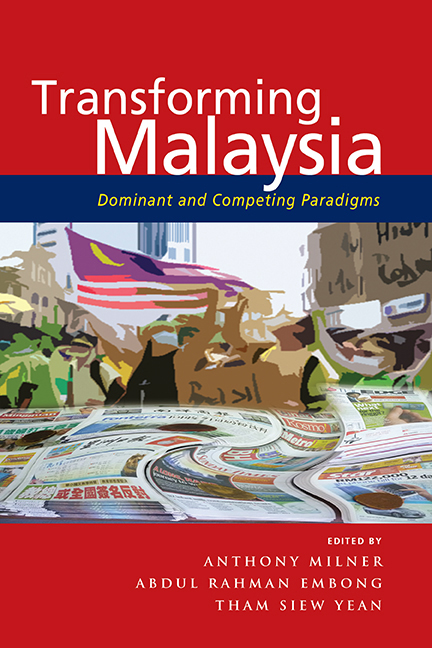Book contents
- Frontmatter
- Contents
- List of Tables and Figures
- Preface
- Acknowledgements
- List of Contributors
- 1 Introduction
- 2 Race and Its Competing Paradigms: A Historical Review
- 3 Knowledge Construction, the Rakyat Paradigm and Malaysia's Social Cohesion
- 4 Race Paradigm and Nation-Building in Malaysia
- 5 Race-Based Paradigm in Poverty Eradication and Income Distribution Analysis and Policy
- 6 Foreign Workers in Malaysia in the Post-Independence Era: Race Paradigm in State Policy, Academic Writings and Public Discourse
- 7 Trade Policy Formulation in Malaysia: Navigating between the Economic and Race Paradigms
- 8 National Security Conceptions and Foreign Policy Behaviour: Transcending the Dominant Race Paradigm?
- Index
8 - National Security Conceptions and Foreign Policy Behaviour: Transcending the Dominant Race Paradigm?
Published online by Cambridge University Press: 21 October 2015
- Frontmatter
- Contents
- List of Tables and Figures
- Preface
- Acknowledgements
- List of Contributors
- 1 Introduction
- 2 Race and Its Competing Paradigms: A Historical Review
- 3 Knowledge Construction, the Rakyat Paradigm and Malaysia's Social Cohesion
- 4 Race Paradigm and Nation-Building in Malaysia
- 5 Race-Based Paradigm in Poverty Eradication and Income Distribution Analysis and Policy
- 6 Foreign Workers in Malaysia in the Post-Independence Era: Race Paradigm in State Policy, Academic Writings and Public Discourse
- 7 Trade Policy Formulation in Malaysia: Navigating between the Economic and Race Paradigms
- 8 National Security Conceptions and Foreign Policy Behaviour: Transcending the Dominant Race Paradigm?
- Index
Summary
INTRODUCTION
The scope, goals, approaches and strategies of Malaysian national security reflect the struggle to build a nation out of a state inherited from British colonialism — an effort which is increasingly premised on broader notions of comprehensive security incorporating the political, military, economic, socio-cultural, psychological, and environmental dimensions of national survival and advancement. Malaysian conceptions of national security are therefore informed by factors based on history, geography, political culture, pluralism, Malay nationalism and ethno-religious identity, the character of political and economic development, problems and goals of national unity and integration, as well as perceptions regarding the nature of internal, regional, and international conflicts.
Ethnicity or race has played an important role in national and international politics. In America, the Jewish lobby is known to exercise disproportionate influence in terms of the numerical size of the Jewish community. In India, for instance, “caste” can be substituted for race to produce a similar effect, i.e. affirmative action policies are constitutionally endorsed for protecting and promoting the welfare of “schedule castes”. In the Malaysian context a Malay-dominant political elite has emerged with attendant consequences for foreign as well as domestic politics — with the management of foreign policy largely in the hands of the politically dominant Malay/Muslims. The impact of domestic, regional and international developments such as the drive towards modernization, industrialization, regionalization and globalization has impelled the national leadership to redefine and reinvent the nation by infusing a new sense of purpose and direction that would strengthen national security as well as regional peace and prosperity. In pursuing this thrust, the UMNO-dominant political leadership has attempted to maintain and even consolidate the dominant race paradigm anchored in Malay hegemony.
This conceptualization of security in Malaysia contains both domestic and external dimensions. Conceptions of domestic security clearly continue to emphasize internal peace, law, and order so that the daily business of governing and fulfilling the needs and demands of a multiracial society is not disrupted by chaos leading to violence. Internal tranquility is a sine qua non for development and progress, and in Malaysia it carries the idea of a Malay race whose political dominance remains paramount while its economic strength depicts an upward trajectory.
- Type
- Chapter
- Information
- Transforming MalaysiaDominant and Competing Paradigms, pp. 202 - 223Publisher: ISEAS–Yusof Ishak InstitutePrint publication year: 2014

